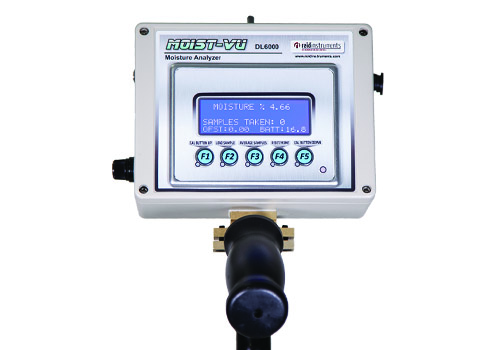
In 2007, Hydronix entered a business relationship with Reid Instruments and embed their microwave sensor technology into portable and tabletop moisture measurement instruments for agriculture applications. Hydronix is a world leader in Microwave Moisture technology. Embedding their sensors in our meters provide several advantages for other types of instruments as follows:
1) A stabilized reading within a few seconds of measurement
2) Built to industrial grade standards to withstand a wide range of environmental and shock conditions
3) Adjustable calibration for both Hops
TAKE THE GUESS WORK OUT OF MEASURING MOISTURE IN DRYER KILN
Acheive your target moisture.
ORGANIC KILN DRYER MOISTURE METER – MOIST-VU DL6000
Developed specifically for measuring moisture Hops, while drying in the Kiln.
Measuring moisture in loose organics such as hops is difficult while drying in the Kiln.
As a producer, you attempt to determine the proper moisture content knowing that your product cannot be too wet, or too dry for further processing.
Instead of guessing, be certain your product has acceptable moisture levels by using
the DL6000’s Microwave Resonant Frequency Shift technology to penetrate the
organic material in front of the measurement faceplate.
The Moist-VU incorporates self-calibrating start up with the ability to load, store, and average the readings in order to calculate your target moisture.

When drying Hops at approximately 140 deg F, moisture drops rapidly as the kiln approaches 15% moisture content. Hops do not dry evenly in the kiln. You must be able to take several readings through across the kiln in a short amount of time during the “Critical Measurement Time.”
ACCURATE TIMELY MEASUREMENTS PREVENTS OVER DRYING THE PRODUCT



he Reid Instruments Moist-vu Hops Moisture Meters are embedded with Ultrasonic Frequency Sensors manufactured by Hydronix in the UK. We take these industrial grade sensors and calibrate them for loose “Uncompacted” hops while they are drying in drying beds and kilns. After much testing, a final calibration was achieved in 2007. All meters since then have been shipped with this “Standard Calibration”. It’s important to understand that physical structure and the compression or compactness of the sample tested also influences the frequency shift and thus, the meter output. There are many different varieties of hops, whose size and organic structure vary between types and region grown. Many years of use and testing here in the Pacific North West has shown that an offset or deviation from the standard calibration can occur as much as plus or minus 3%. Also here in the Northwest, the growers dry in large kilns and vary the depth of the hops from 24 to 36 inches. The growers using the portable meters in large kilns determine what that “offset” is after an initial few days of drying and comparing their Kiln Readings via the meter and the final Bale Reading via the hay bale meter.
Because of the many variables as described above, it is recommended that the user test the final product with other known and accepted standard meter types. In the case of large North West Growers, the hops are hydraulically compacted into 400 lbs bales. Because the hops are now highly compacted, a simple “Hop Bale Meter” is used to get a finished reading. These inexpensive prong type resistance meters work well in compacted material but will not give acceptable results in loose non compacted hops while drying. After the hops are determined to be dry enough they are pushed off the kiln and onto the floor to sit for approx 8 hrs before going to the baler. The compressed bale moisture is tested with a probe type “Hay Bale Meter. “The grower wants to get as close to 10% moisture as possible. Our portable meter was designed to help you determine when to stop drying to reach that “Target Moisture” 8 hours later in the Bale. The user should understand that there are several variables between hop varieties and drying methods and times that will result in an “Offset” deviation between what average meter reading is in the kiln, and what the final moisture reading result is in the compacted bale.
As an example if the hops are being laid deeper in the kiln, the average meter reading will be higher and just the opposite if the hops are at less depth than 28 inches. Different varieties have slightly different “Organic Structure” which can also have affect on the meter reading.
Growers report to us that it takes several kilns to determine what their average meter reading should be to achieve their desired target value in the bale. Experience has shown it can vary anywhere between approx 8.0 to 11.0% meter reading. This is called the OFFSET.
When the meters are shipped they will read approx 6.5% after doing a self zeroing in the stand on start-up. The portable meter DL-6000 used in large kilns does have off-set or calibration adjustment. For users that are interested in doing their own calibration, a comm port is available on all meters. A computer interface is available for purchase. “Hydrocom” programming software can be downloaded for free from the Hydronix web site.
USING FOR THE FIRST TIME
For first time users of our meters, we recommend you send us a sample of your “Dried Hops” so that we can correct the standard calibration, if necessary, to your specific variety prior to shipping the new meter.